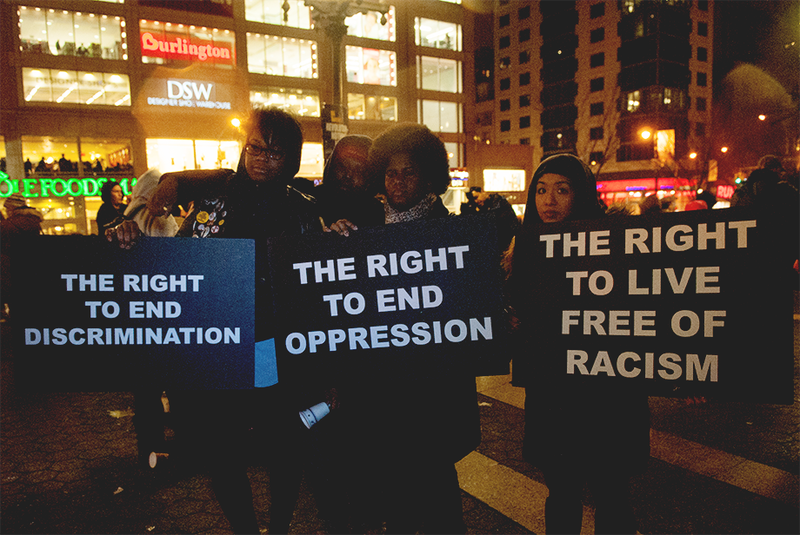Last year, the former head of Human Rights Watch and the Open Society Foundation, Aryeh Neier, argued in openGlobalRights that human rights and social justice are distinctly different beats. Human rights, Neier wrote, are limits on state power, while social justice seeks to redistribute material resources.
London School of Economics professor Margot Salomon disagreed, writing that the struggle for social justice and human rights are identical, since both seek to redistribute power.
If this debate were purely one of opinion, I would not get involved. The argument matters, however, because conflation of social justice with “rights” weakens the human rights movement and even undermines its stated goals.

Julia Reinhart/Demotix (All rights reserved)
Are all rights truly "indivisible"? Pedro Pizano explains why human rights should not be conflated with social justice.
Economic and social standards are certainly worthy and legitimate political goals that people should strive for, over time. They are what every decent society should try to bring about: adequate shelter, food, health care, work, education, retirement benefits, and cultural resources, for all.
Human rights, by contrast, are immediately enforceable and always justiciable. One can and should go to court and demand one’s immediate right to worship in any manner of his or her choice. The state must immediately refrain from violating this right, and must provide swift redress when necessary.
Social and economic justice, on the other hand, is something to be progressively realized. States promise to fulfill social and economic rights in the future, given available resources and capacities. These are aspirations, not immediately enforceable rights.
This is as it should be. After all, we don’t want states arguing that one’s right to freely worship cannot be fulfilled, at present, because the state doesn’t have sufficient resources.
I do, however, accept as perfectly reasonable that some states cannot immediately provide adequate shelter, healthcare, or nutrition, because they don’t have the money or the administrative capacity.
Societies that seek to provide food and shelter at the expense of freedom of worship often fail miserably at both.
From the Soviet Union to present-day China, Saudi Arabia, Cuba, and Venezuela, economic and social standards are the “rights” that dictators love. These leaders use their social policies as whitewash for their dismal human rights records, celebrating their social policies while ignoring the population’s immediate right to political participation and freedom from arbitrary detention, torture, and death.
Yet proponents of social rights often argue that rights are “indivisible.” After all, if you have no food or shelter, why does it matter whether you have freedom of worship?
It does matter. Not only because religious organizations provide essential material goods to the needy, but more importantly, because societies that seek to provide food and shelter at the expense of freedom of worship often fail miserably at both.
If all rights were truly indivisible, one could not have religion without food, or vice versa. But this is patently untrue. After all, one can have enough to eat while still not being able to worship freely. And one can worship as one wants, but still have insufficient access to shelter, healthcare, or education. People all over the world experience these conditions every day.
When a society limits itself to safeguarding its citizens’ civil and political rights, it allows individuals to organize themselves freely to obtain food and shelter. And when the state guarantees its citizens’ civil and political rights, people can pursue, through political means, the provision of sufficient food and shelter for all.
Consider also this: Jacob Mchangama, managing director of the Freedom Rights Project, has found in a recent working paper that social and economic rights do not, in fact, advance social justice, and may even have unanticipated negative effects.
“We're interested in whether justiciable social and economic rights have played a part in developing the social justice they pretend to advance,” Mchangama told me in Copenhagen, referring to his work with economist Christian Bjørnskov. “But there doesn't seem to be a lot of evidence for this.”

Kathleen Maher/Flickr
(Some rights reserved)
In their working paper, Mchangama and Bjørnskov examine 188 constitutions to see whether states’ introduction of the right to education, health, and social security are statistically associated with improvements in those policy areas.
They conclude, however, that, “there is no tangible, empirical basis for claiming that the introduction of [economic and social] rights, at the national or international level, makes any difference in the desired direction.”
In fact, the opposite may be true, since Mchangama and Bjørnskov’s analysis also demonstrates “adverse, medium-term effects on education and inflation.”
Their paper is still under peer review, and more empirical research is warranted. Still, even if only partially true, these findings should persuade activists to reconsider their assumptions.
In short, everyone in the human rights community needs to carefully distinguish “social justice” and “human rights.” Conflating the two only muddies the conceptual waters and helps rather than hinders those who seek to limit our freedom.

Read more
Get our weekly email







Comments
We encourage anyone to comment, please consult the oD commenting guidelines if you have any questions.